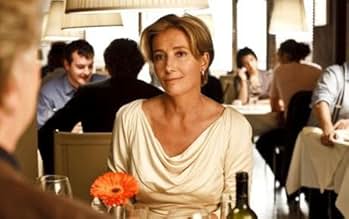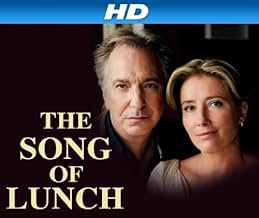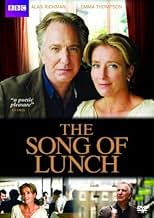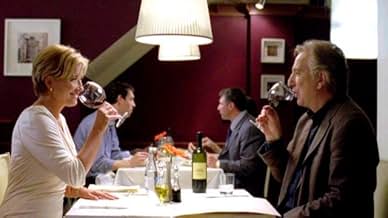The Song of Lunch
- टीवी फ़िल्म
- 2010
- 50 मि
IMDb रेटिंग
7.3/10
2.7 हज़ार
आपकी रेटिंग
अपनी भाषा में प्लॉट जोड़ेंA London publisher recounts a lunchtime reunion with a former lover, in poetic monologue.A London publisher recounts a lunchtime reunion with a former lover, in poetic monologue.A London publisher recounts a lunchtime reunion with a former lover, in poetic monologue.
- निर्देशक
- लेखक
- स्टार
- 1 प्राइमटाइम एमी के लिए नामांकित
- 4 कुल नामांकन
Christian Wolf-La'Moy
- Advertising Guy Talking with Massimo
- (बिना क्रेडिट के)
फ़ीचर्ड समीक्षाएं
A beautiful tale of two long lost lovers that doesn't fail to lift your spirit. Despite only being a short film I enjoyed it very much. Perfectly assembled with great cinematography which compliments the original poem greatly. The melancholy and passion between the protagonists were definitely sustained through out the film steering it away from titles bearing names such as Depressing-love-story-for-the-over-40s or a Horny- middle-aged-people-have-a-rendez-vous. No better actors could have been picked for this. A brilliant performance on behalf of both Alan Rickman and Emma Thompson who portray the characters exact to how I had imagined them to be.
All in all 'tis a great film. However, I advise people to read the book first before watching the film.
All in all 'tis a great film. However, I advise people to read the book first before watching the film.
Combining the art of filmmaking and the art of poetry is extremely difficult, very complex undertaking for any director. It is much easier and with more opportunities to just film from a screenplay, where dialogue can flow with no absolute firm structure, do an actor can or director can change a word or two or more. No one can improvise working with a poem. Song of Lunch works like a fine waltz. Christopher Reid's poem is brilliant, as are Alan Rickman and Emma Thompson who dance his stanzas, as we hear them narrated by Rickman. The pacing of this film is so well done that we are are pulled in immediately and stay in pace up until the ending.
He came close to his fantasy, a renewal. But shortly let his mind take him down a trail of various sorts of negativity. He was on that line a bit, a line where he could have been witty and upbeat and challenging, a line he crossed into torpor and, well, annoyance, and more.
Or perhaps He knew something the other reviewers here (and they are a very solid group of reviewers) did not know: That She too wanted a renewal. Though her words bely that possibility, well into the film, she touches his hand in a way that is personal and perhaps a bit erotic. Perhaps in her wonderful life with a successful author and two nondescript kids, she would like to recoup her past with He.
Perhaps He knew this, and sabotaged it. If so, Why?
The subject that screenwriters love to chat about, subtext, comes up. I thought the Mamet fiasco, PHIL SPECTOR, had the characters all delivering subtext as dialogue. Thus there was no mystery. Here, however, the subtext was given us in his unspoken words, his thoughts, as voice-over dialogue in his own head. Perambulating in his skull. It worked.
For Rickman, I find this his second most compelling work, the first being CLOSET LAND (which I saw on a Saturday night in a popular movie theater, but only me in the room for that film). Both works exploit his rich voice.
Or perhaps He knew something the other reviewers here (and they are a very solid group of reviewers) did not know: That She too wanted a renewal. Though her words bely that possibility, well into the film, she touches his hand in a way that is personal and perhaps a bit erotic. Perhaps in her wonderful life with a successful author and two nondescript kids, she would like to recoup her past with He.
Perhaps He knew this, and sabotaged it. If so, Why?
The subject that screenwriters love to chat about, subtext, comes up. I thought the Mamet fiasco, PHIL SPECTOR, had the characters all delivering subtext as dialogue. Thus there was no mystery. Here, however, the subtext was given us in his unspoken words, his thoughts, as voice-over dialogue in his own head. Perambulating in his skull. It worked.
For Rickman, I find this his second most compelling work, the first being CLOSET LAND (which I saw on a Saturday night in a popular movie theater, but only me in the room for that film). Both works exploit his rich voice.
Alan Rickman plays a jaded publisher meeting a past flame (Emma Thompson) at an old haunt, now impersonally renovated. The publisher has a one-track mind and views her every move as erotic.
This is a dramatised narrative poem. I'm sceptical about modern poetry but this one's quite good. It may be familiar ground but a lot of the phrases are actually quite good: consciously poetic but a concise description. Fans of Alan Rickman might find it hard to control himself as his character is aroused by everything: a squeezed hand, a glass of wine meeting his lips, a comely waitress, even a pepper shaker. The story is told through his perspective, much of it as voice-over. The switch between voice-over and dialogue really works, creating tension and drama in what is a fairly undramatic scene. It's like a short play.
Both Rickman and Thompson speak the blank verse (with the occasional rhyme) very naturally. Their characters are intellectual people and the talk comes naturally to them, particularly Rickman's emotionally/creatively/sexually frustrated character.
It's only 50 minutes so it's worth a watch. It would have been nice if it were part of a series of poems.
This is a dramatised narrative poem. I'm sceptical about modern poetry but this one's quite good. It may be familiar ground but a lot of the phrases are actually quite good: consciously poetic but a concise description. Fans of Alan Rickman might find it hard to control himself as his character is aroused by everything: a squeezed hand, a glass of wine meeting his lips, a comely waitress, even a pepper shaker. The story is told through his perspective, much of it as voice-over. The switch between voice-over and dialogue really works, creating tension and drama in what is a fairly undramatic scene. It's like a short play.
Both Rickman and Thompson speak the blank verse (with the occasional rhyme) very naturally. Their characters are intellectual people and the talk comes naturally to them, particularly Rickman's emotionally/creatively/sexually frustrated character.
It's only 50 minutes so it's worth a watch. It would have been nice if it were part of a series of poems.
This is the worst thing I've seen since My Dinner with Andre over thirty years ago. It's worse than Hook, worse than Australia, worse than the worst action movie I used to take my teenage son to see to humor him.
Is he supposed to be unlikable, or merely a bore?
What could she have possibly ever seen in him?
Who cares about his "poetry"?
The lines are unbearable, not to mention childishly vulgar, when not being unintentionally laughable.
Is this what "art" has become, ridiculously pretentious, lacking in content, causing one to itch with utter boredom?
Is he supposed to be unlikable, or merely a bore?
What could she have possibly ever seen in him?
Who cares about his "poetry"?
The lines are unbearable, not to mention childishly vulgar, when not being unintentionally laughable.
Is this what "art" has become, ridiculously pretentious, lacking in content, causing one to itch with utter boredom?
क्या आपको पता है
- ट्रिवियाThe photo on the dust jacket of the lead female character's husband's book is one of Greg Wise, Dame Emma Thompson's real-life husband.
- कनेक्शनFeatured in The Wright Stuff: एपिसोड #14.45 (2010)
टॉप पसंद
रेटिंग देने के लिए साइन-इन करें और वैयक्तिकृत सुझावों के लिए वॉचलिस्ट करें
विवरण
इस पेज में योगदान दें
किसी बदलाव का सुझाव दें या अनुपलब्ध कॉन्टेंट जोड़ें



























